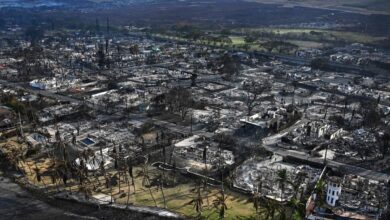‘Alarm bell for humanity’: Amazon now ‘alarmingly close’ to critical tipping point of no return

The Amazon rainforest is now “alarmingly close” to reaching a critical tipping point from which there is no return, with “catastrophic consequences for people and planet”, new WWF research warns.
The charity said the study, released on Biodiversity Day at Cop27, sounds an “alarm bell for humanity”, and in the worst case scenario, the so-called “lungs of the world” could case to function as a vital global climate regulator within just 10 years.
The worsening climate crisis, deforestation and degradation are all pushing the Amazon towards tipping into a permanently degraded state, with the WWF saying the forest as we know it and may die by 2030 – “risking catastrophic consequences for nature”.
If such a tipping point is reached the forest would change forever, the authors of the report said, with more frequent drought and fires preventing its recovery, and releasing enough carbon to put the 1.5C global climate target out of reach.
The researchers said over a third (34 per cent) of the Amazon biome area has already experienced at least one of three theoretical tipping point thresholds related to rainfall, length of dry season and deforestation or conversion of natural habitats.
The charity said the situation requires immediate, global action from the UK and global governments as well as the private sector.
Mary Gagen, the lead author of the report and WWF’s chief forest advisor said: “This paper sounds an alarm bell for humanity, revealing the twin threats of climate change and forest loss are pushing the world’s largest rainforest alarmingly close to a precipice.
“We could lose the Amazon to a state of permanent, irreversible degradation that would impact the entire planet.
“The more the Amazon is destroyed, the more we limit our ability to stay within 1.5 degrees. The evidence gives a stark warning that we need to take the tipping point risk seriously and act to immediately cut emissions and address the cavalier attitude to forest loss and degradation which are sending people and planet down a path to disaster.”
She added: “Only by listening to the voices of Amazonia’s peoples and by protecting and restoring nature can we bring our world back to life.”
The research comes weeks after Brazil elected former president Luiz Inacio Lula da Silva into office, marking the end of Jair Bolsonaro’s presidency.
Under the Bolsonaro administration, destruction of the Amazon surged, doubling CO2 emissions from wildfires between 2019 and 2020 and with deforestation reaching a 15-year high in 2021.
The paper’s release also coincides with the delivery of a damning human rights complaint to the UN from five Brazilian NGOs, including WWF Brazil, against the outgoing Bolsonaro government.
The complaint asserts that the uncontrolled increase in deforestation and violence against indigenous peoples and traditional communities seen under his regime amount to severe human rights abuses.
Brazilian Indigenous lawyer Eloy Terena who heads the legal work at the Articulation of Indigenous Peoples of Brazil, one of the complainants, said: “Indigenous peoples are environmental defenders. When we fight to defend our lands, we are fighting for life on the whole planet.
If one indigenous land is invaded, deforested, if one indigenous group is threatened, harassed, the whole globe suffers the impact. The Bolsonaro administration violated the Brazilian constitution and international treaties on human rights, and we cannot accept that.”
Analysis suggests the end of Mr Bolsonaro’s presidency could see deforestation rates now plummet by almost 90 per cent.
“Let’s fight for zero deforestation,” Mr Lula said in his first speech as president-elect.
“Brazil is ready to resume its leading role in the fight against the climate crisis, protecting all our biomes, especially the Amazon Forest.





